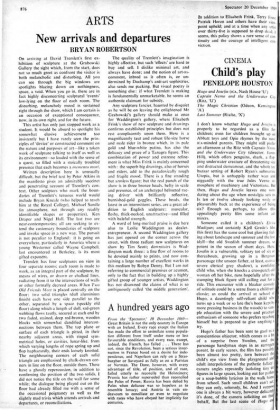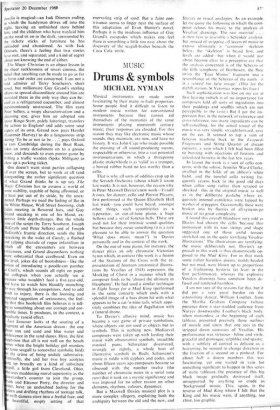CINEMA
Child's play
PENELOPE HOUSTON
Hugo and Josefin (IcA, Nash House 'U') Captain Nemo and the Underwater City (Ritz, 'U') The Magic Christian (Odeon, Kensington 'A') Last Summer (Rialto, 'X')
I don't know whether Hugo and Jose fin is properly to be regarded as a film for children; even for children brought up on Abbatt toys and Opie rhymes by the most icA-minded parents. They might still prefer an afternoon at the Ritz with Captain Nemo and the Underwater City (director, James Hill), which offers penguins, shark, a flap- ping underwater creature of threatening size and distracted demeanour, and the whole to) bazaar setting of Robert Ryan's submarine Utopia, but is unhappily rather wan and niggardly with the true Jules Verne at- mosphere of machinery and Victoriana. But then, Hugo and Josefin leaves one won- dering about the age when nostalgia sets in.
Is ten or twelve already looking wrily or pleasurably back at the experience of being six? Enough so, perhaps, to allow this appealingly pretty film some infant ad- mirers.
Someone called it a children's Dein, Madigan; and certainly Kjell Grede's film (his first) has the same cool but glowing feel- ing about landscape and summer and the lost idyll—the old Swedish summer dream, so potent in the season of short days. Here, Josefin is a vulnerable, solitary tot of six or thereabouts, growing up in a Bergman parsonage (the unseen father, at least, casts a severe clerical grey shadow), a confiding child who, when she knocks a crosspatch old woman oft her bike, runs hopefully after the stumping black figure still calling out for a ride. This encounter with a bleaker comedy' of solitude could be a scene from a children's classic; as could the arrival at school of Hugo, a dauntingly self-reliant child who turns up a week or so late (he's been kept by more pressing business in the woods) to sam- ple education with the severe and practical enthusiasm of someone who prefers teaching himself but is prepared to give anything a try.
Hugo's father has been sent to gaol as a conscientious objector, which comes as a bit of a surprise from Sweden, and the parsonage handyman steps in as surrogate
parent. In early scenes, the film has possibly been almost too pretty, torn between the child's eye view from the playground and adult interpolations of the pathetic fallacy: camera angles repeatedly isolating tiny tot figures in large spaces, looking out for pathos
or a soap-bubble lyricism in the walk home from school. Such small children can't act; they can only, solemnly, be. And I suppose one is always a bit wary, however delicate! it's done, of the camera soliciting on the behalf. But the last scene of Hugo josefin is magical—an Isak Dinesen ending, in which the handyman drives off into the eight, leaving an unfinished story behind him, and the children who have waylaid him on the road sit on in the dark, surrounded by the rickety sticks of furniture he has unloaded and abandoned. As with Isak Dinesen, there's a feeling that two stories have met, and separated; and a kind of regret about not knowing the end of either.
The Magic Christian is an object lesson in the sheer recklessness of smart cinema, the belief that anything can be made to go as far as form and order are concerned. I am not a ild admirer of Terry Southern's short novel, but millionaire Guy Grand's sterling efforts to spread discomfiture around him are narrated there in the only way they can be: cool as a refrigerated cucumber, and almost parsimoniously unstressed. The film casts Peter Sellers, a wispy characterisation and a .deaming eye, gives him an adopted son poor Ringo Starr, palely loitering), transfers he action to England and adds some sour capers of its own. Grand now pays Hamlet (Laurenoe Harvey) to do a languorous strip during To be or not to be ...', pays Oxford to ram Cambridge during the Boat Race, takes an army detachment on to a grouse moor, and descends to even punier game by bribing a traffic warden (Spike Milligan) to chew up a parking ticket.
One doesn't want stout ,parties collapsing all over the screen, but to work at all (and disregarding the rather significant question of what Grand thinks he is up to), The Magic Christian has to assume a world of some stability, capable of being affronted, or at least put out of its stride, by the unex- pected. Perhaps we need the feeling of Ike in the White House, Wall Street booming, club ladies meeting in flowered hats, and Guy Grand sneaking in one of his bland, ex- pensive little depth-charges. But the whole one of the script (by Terry Southern, Joseph McGrath and Peter Sellers) and of Joseph McGrath's frantic direction, sends the film queaking in the wake of Candy, a flushed Ind yelping charade of rogue infantilism in llich all the encounters are between aricatures, and Grand discomforts nothing ore substantial than cardboard. Even on his level, jokes die of boorishness—like the otion of introducing a poodle-cut panther I Craft's, which sounds all right on paper ut collapses when you actually see a reature who wouldn't fool a five-year-old, nd have to watch him bloodily munching is way through his competitors. And to add sult to injury, there is the looming and epeated suggestion of seriousness, the feel- g that this boobyish film believes it is tell- .? us something about our corrupt and cor- uptible times. It produces, in the context, a -culiarly rancid effect.
Last Summer looks at the souring of a agment of the American dream: the one bout sun and sand and blue water and dolescence in the sand dunes. Here, the first ggestion that all is not well on the beach Ines when the bright holiday girl murders -r tame seagull (a somewhat symbolic bird) r the crime of being unduly submissive. ventually, she and her two boy acolytes 'ng up brutally on a kind of substitute aguil, a little girl from Cleveland. Ohio, ho uses maddening moral superiority as the te-crasher's counter to join the group. rank and Eleanor Perry, the director and !ler, have an undoubted feeling for the rlorn and drifting rhythms of teenage talk, swift camera stare into a fretful face, and
beautiful, empty setting of that enervating strip of sand. But a faint con- trivance seems to linger near the surface of this adaptation of Evan Hunter's novel. Perhaps it is the insidious influence of Guy Grand's escapades which makes one feel there is something a little too easy about the discovery of the seagull-basher beneath the Coca Cola smile.



































 Previous page
Previous page